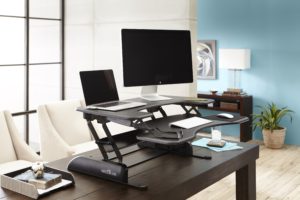 “Sitting is the new smoking,†says South African physical therapist and entrepreneur Gary Arenson. He’s quoting an expression originally coined by researchers at the Mayo Clinic to describe the serious health risks – including heart disease, diabetes, arthritis and osteoporosis – connected with prolonged sitting, whether in front of the television or, in particular, at an office desk hunched over the computer.
“Sitting is the new smoking,†says South African physical therapist and entrepreneur Gary Arenson. He’s quoting an expression originally coined by researchers at the Mayo Clinic to describe the serious health risks – including heart disease, diabetes, arthritis and osteoporosis – connected with prolonged sitting, whether in front of the television or, in particular, at an office desk hunched over the computer.
The data coming in is shocking. A study by the American Cancer Society which tracked 123,000 Americans over a 14-year period found that women who sat for 6 or more hours a day were 40 percent more likely to die within the study period compared with women who sat for less than 3 hours. For men it was “just†20 percent more.
Another study from the Kaiser Permanente HMO in California following 80,000 men aged 45 and above revealed that those who spent the most time sitting were more than twice as likely to develop heart disease as those who sat the least.
Exercise doesn’t seem to reverse the effects, either.
The dangers associated with excessive sitting have led increasing numbers of office workers to buy or build their own standing desks – raised platforms for their computer screens and keyboards. But standing only desks are quickly abandoned – workers get tired of being on their feet all day and go back to their original sitting situation.
As a result, sitting-standing hybrid desks that can be raised or lowered with the flip of a switch and a quick tug have become increasingly popular. Some are entire standalone pieces of furniture; others sit on top of one’s existing desk.
Now, the leading manufacturer of the hybrid approach, Varidesk, is making aliyah, courtesy of Arenson and his business partner Issy Zimmerman who have obtained the distribution rights to sell Varidesk in Israel.
For Arenson and Zimmerman, it’s a kind of immigration by proxy. While both are staunch Zionists, they have built their professional and personal lives in South Africa and are staying put. “So, as a religious Jew, the opportunity to invest in Israel and at the same time do something incredible health-wise for the Israeli market really motivated me,†Arenson tells The Jerusalem Post.
Arenson will also be selling Varidesk in South Africa, through his company Ergotherapy, which develops and sells its own line or ergonomic chairs and is built off of Arenson’s medical experience helping people with some serious aches and pains.
“Statistically, 80 percent of people will suffer from back pain at some point in their lives,†Arenson says. “It’s far more prevalent than people realize, and not just with older people. The average age of an office worker using a Varidesk is 40-55.â€
Varidesk, whose motto is “Work elevated,†isn’t the first sitting-standing hybrid desk to enter the Israeli market, but it’s the easiest to use, which is a big selling point. The units – which come in a variety of sizes from 30 to 48 inches – come fully assembled. You just hoist them onto your desk and you’re ready to go.
Each Varidesk unit has two tiers – one for your keyboard and another for the monitor. The design eliminates the need to place the screen on a pile of books or a ream of paper, although it’s not ideal for all-in-one computer systems like Apple’s iMac which has a built-in stand leading to neck strain. A smaller Varidesk version is designed for laptops. In all units, a simple quick release grip moves both tiers smoothly into one of a dozen positions in seconds.
The desks are heavy – the 36-inch version we tried weighs 35 pounds – which makes them feel sturdy, an important quality (you don’t want to feel like your expensive computer could topple over at any second if you lean on the desk the wrong way).
Arenson says the Varidesk’s user-friendly design is critical to ensuring “patient†compliance. “If you have to move your computer to one side, then put something on your desk, then move your monitor on top of that, your compliance will be less,†he says. It was something he learned from his 15 years as a physical therapist. “It doesn’t do any good if I tell people to do all these fancy stretches that they won’t do. People don’t want to change their work habits and patterns too much.â€
Another key is “balance,†Arenson says. You want to split your day half and half between sitting and standing. People who work mostly out of the office probably don’t need a sitting-standing desk.
Not everyone will take to a Varidesk, Arenson concedes, which is why the company offers a 30-day trial with a money back guarantee. Since Arenson and Zimmerman aren’t relocating, their local representative, another South African Stanley Behrman, will be making house and office calls to make sure new Varidesk owners are comfortable and setting their desks at the right height.
Offices with many workers will be able to get a few units to try out at no cost, giving employees a chance to test drive the sitting-standing experience, before deciding if they want their own.
The first Israeli Varidesks are “on their way to port of Ashdod now,†Arenson says and he will keep with Varidesk’s U.S. policy of always having enough in stock so there’s never a waiting list.
One thing that won’t be the same as the U.S. – the price. The starting price for a Varidesk in Israel is NIS 2,500. That’s at least 40 percent more than it would be in North America.
There’s no way around it: the cost of shipping, VAT and customs all take their toll. “It’s the same price we sell them for in South Africa,†Arenson says, trying to blunt the sticker shock. And it’s less than the NIS 3,400 starting price for competitor Ergotron’s Workfit, which is currently the leader in the Israeli market.
Is Arenson worried that Israelis will balk at the price? Not at all, he says. In fact he expects typical Israeli negotiation. “We’ll need to work hard to substantiate both our product and our price point.†That said, there will certainly be volume discounts for offices buying more than one Varidesk at once.
Arenson and his team plan to sell in Israel exclusively via the web and through direct face-to-face sales, so don’t expect to pick one up at your local office supplies store. (Although if they do, Arenson’s partner Zimmerman should be able to offer some expertise: he ran the Toys R Us franchise in South Africa for many years before going into business with Arenson.)
Standing desks are gaining popularity in the U.S. and Europe, particularly in Scandinavia. Slingsby, a U.K.-based workplace equipment provider, estimated that 80 percent of office workers in Denmark, Sweden, Norway and Finland now have adjustable desks.
“Recommendations suggest that workers should aim to stand for at least two hours each day which they can increase once they’re used to it,†says Lee Wright, group sales and marketing director at Slingsby. “Standing on a soft floor surface is [also] more preferable than a hard floor.â€
“Sitting is more dangerous than smoking, kills more people than HIV and is more treacherous than parachuting,†says Dr. James Levine, director of the Mayo Clinic-Arizona State University Obesity Solutions Initiative. “We are sitting ourselves to death.â€
Standing desks have a couple more advantages – both somewhat surprising. People who suffer from ADHD have reported that they find it easier to focus while standing than sitting, Arenson says. And if you stand a few hours every day while you power through those PowerPoint presentations, you’ll burn an extra 600-700 calories a week, Arenson says.
It may not be enough to quit the gym, but it’s still a nice bonus to the already demonstrated health benefits of getting off your tush while you work.
I originally wrote about Varidesk for The Jerusalem Post.
{ 1 comment }



